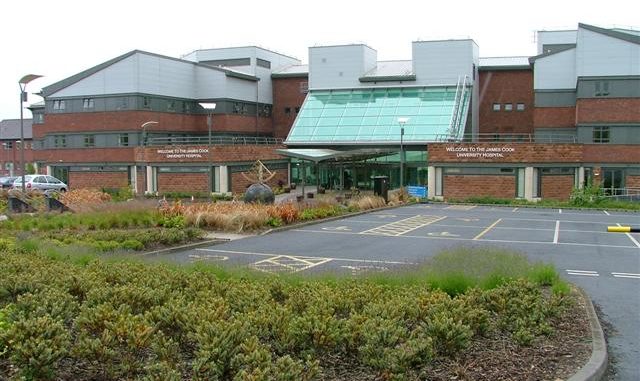
Inspectors have rated critical care at James Cook Hospital in Middlesbrough as “inadequate” after finding that “harm occurred” to patients because beds weren’t available.
The Care Quality Commission (CQC), which regulates and inspects health and social care services in England, has given South Tees Hospitals NHS Foundation Trust the worst possible rating – inadequate – for the critical care provided at James Cook and the Friarage hospitals.
Critical care, also known as intensive care, is for patients whose conditions are life-threatening and require constant monitoring, often in specialist units.
It was suspended at the Friarage Hospital in March following changes to its A&E department.
The report has been published just days after an independent study commissioned by Richmond MP Rishi Sunak found that James Cook hospital would be able to cope following the the closure of the A&E at the Friarage Hospital in Northallerton.
In its damning report, the CQC said inspectors had identified several concerns with infection control, pressure care management and “capacity challenges”.
“Staff were not reporting staffing shortages and their impact, and infection control breaches were due to the service not being able to isolate patients with an infection.”
Following the inspections in January and February this year, the CQC has now downgraded the trust’s rating for being “safe, effective and well-led” from Good to Requires Improvement.
The trust did retain its Good rating for being caring and responsive.
The overall rating for the services provided by the South Tees Hospitals NHS Foundation Trust is now rated as Requires Improvement. Previously the overall rating for the trust had been Good.
A team of CQC inspectors visited the trust between January 15 and 17 and February 5 and 7 this year.
They assessed four core services – urgent and emergency, medical care, surgery and diagnostic imaging – across both James Cook University Hospital and Friarage Hospital.
They also looked specifically at management and leadership to answer the key question: “Is the trust well-led?”
During this part of the inspection, concerns about critical care services were identified prompting an unannounced inspection of the service between February 21 and 23.
As a result, critical care in both hospitals was rated Inadequate – the lowest rating possible – and the trust’s overall rating was dropped from Good to Requires Improvement.
CQC has also published the trust’s Use of Resources (UoR) report, which is based on an assessment undertaken by NHS Improvement.
The trust has been rated as Requires Improvement for using its resources productively.
The combined rating for the trust, taking into account CQC’s inspection for the quality of services and NHSI’s assessment of Use of Resources, is Requires Improvement.
In a statement, the CQC said: “Whilst leaders were aware of some of the risks, issues and challenges they were not always acted upon in an effective or timely manner.
“Some staff voiced concerns that the leadership created a top down and directive culture, staff morale throughout the services was mixed and staff engagement was poor.
“The well-led review prompted an inspection of the critical care services.
“Inspectors found a lack of assurance that nurse staffing levels were appropriate to safely care for patients.
“Inspectors identified several concerns with infection control, pressure care management and capacity challenges – harm had occurred to patients from three serious incidents because critical care beds were not available.
“Staff were not reporting staffing shortages and their impact, and infection control breaches were due to the service not being able to isolate patients with an infection.
“Following the inspection CQC wrote formally to the trust to ensure it took immediate action to protect patients.
“The trust continues to send weekly information to CQC to provide assurance that staffing levels are safe.
“However, inspectors did see staff in the critical care service treating people with kindness and compassion.
“Feedback from patients inspectors could talk with about their care was consistently positive.
“Whilst some concerns were identified in urgent and emergency services and medical care, the care being provided in these services and surgery was good.
“The trust was frequently meeting or exceeding national performance standards in urgent and emergency care.
“Patient flow through the urgent and emergency care service was effective and the leadership was stable, staff felt well supported.
“Previous concerns in medical care had been addressed, refurbishment was continuing and issues with emergency call systems were resolved.”
The chief inspector of hospitals, professor Ted Baker, said: “We saw a lot of good practice across the services we visited.
“Patients felt involved in their care and staff were kind and compassionate.
“However, it was clear that since the last inspection the trust has not sustained all of the improvements they made previously.
“During our visit we identified the need for further inspection and found additional concerns in the critical care services and leadership.
“These improvements need to be revisited and action taken quickly, we will be monitoring the trust’s performance and return to inspect again in due course.”
In response, South Tees Hospitals NHS Foundation Trust said they had addressed a number of the issued raised in the report.
Siobhan McArdle, chief executive, said: “We note the CQC have published their report.
“The report contains a number of actions, many of which we have already completed.
“Within the next three weeks we will have finalised a comprehensive action plan to address all outstanding issues.
“The CQC have rated many of our core services as good and acknowledged the very positive feedback they received from patients and carers during the inspection.
“We would like to thank all of our staff for their continued dedication and commitment to the delivery of good patient outcomes and experiences, often in the most challenging of circumstances.”


Be the first to comment